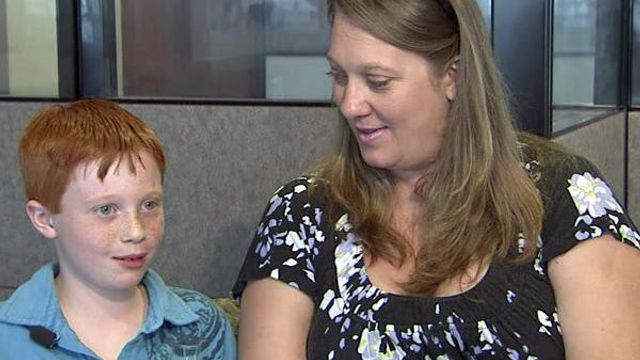State debates how to fund life-saving formula
In an effort to save money, the state is proposing a different way to fund a supplement that doctors say some people with a rare condition – known as Phenylketonuria or PKU – need to live.
Posted — UpdatedAt 8 years old, PKU patient Matthew Arnold can speak extensively about his diet and the foods he cannot eat, such as dairy, meat, eggs, nuts and wheat.
“I can’t eat protein, over 2 grams of protein,” he said.
“Matthew is unable to break down protein that he ingests in everyday food,” said his mother, Julia Arnold, who discovered her son had PKU after a newborn screening test.
The Arnolds must watch everything Matthew eats to make sure his protein level doesn't build up.
“If it does, it attacks the brain, and it will cause mental retardation, and he will eventually die,” Arnold said.
The Arnolds pay for special food each month and rely on a formula to keep Matthew's proteins in check. As do others with PKU, Matthew will need the formula – which can cost up to $10,000 per year – for the rest of his life.
“He has to have that formula to be able to survive,” Arnold said.
The cost is not covered by insurance because, a spokesman for Blue Cross Blue Shield said, they consider the formula a food rather than a medical treatment. The state of North Carolina has traditionally provided the formula through the Department of Health and Human Services.
UNC estimates about 240 people statewide suffer from the genetic disorder. This year, the state paid for 199 patients to get formula at a cost of about $443,000. Of those patients:
- 87 people received products valued at less than $2,000
- 103 received products valued between $2,001-and $7,000
- 9 received products valued between $7,000 and $10,000
This budget go around, the state is trying to save money. State leaders say they are not trying to do away with funding the formula, but they would like to shift the burden to Medicaid, paid for with federal money, or to private insurers.
“The money is not going to be there. We know that it’s not going to happen,” Arnold said.
Dr. Joseph Muenzer, a UNC professor of pediatrics and genetics, said that he worries Medicaid money might not be there and that private insurance won't cover the cost.
“We want a guaranteed source of funding,” he said. “Our concern is if it’s not there, these families will have irreversible harm occur if we can no longer give them formula.”
Arnold said that she worries her family won't be able to buy it on their own and that she already knows their insurance company won't help.
DHHS says the hope is that more patients who qualify will enroll in WIC programs or Medicaid, which changed its policy last year to allow Medicaid dollars to go for the formula.
Sen. William Purcell, co-chair for the Senate Appropriations on Health and Human Services Committee, said DHHS found that the state was providing formula for people who qualified for Medicaid. Purcell, D-Scotland, said he wants more people who are eligible to enroll in Medicaid to save state dollars.
“I don’t think there is any intention of depriving anybody," Purcell said.
• Credits
Copyright 2024 by Capitol Broadcasting Company. All rights reserved. This material may not be published, broadcast, rewritten or redistributed.





